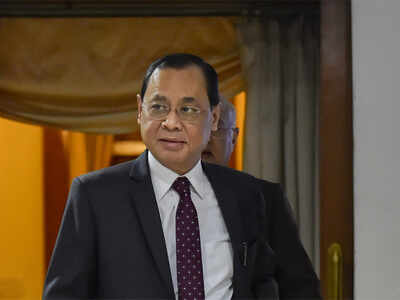
NEW DELHI: Former Chief Justice Ranjan Gogoi on Wednesday launched a scathing attack on a "group of activists, lawyers and journalists" for destroying the judiciary by launching "personal attacks on judges who do not conform" to the group's articulation of "judicial independence".
Participating in a webinar on "judicial independence", Justice Gogoi said as per this group "a judge must necessarily be anti-establishment, eloquent on issues like rich-poor divide, oppression of marginalised, suppression of fundamental rights and must advocate free speech to the extent of defamation".
"If judges don't conform to these expectations, they are attacked personally, not their judgments criticised. This is destructive of the independence of judiciary. The system is not averse to criticism. But, for heaven's sake, be dignified in your attack. Let there be an honest, intellectual, academic exercise. Do not impute motives. It is destructive," he said.
Defending his acceptance of Rajya Sabha member nomination, the former CJI said there are three types of retired Judges. The first category dons the mantle of activist immediately after retirement. "Who are the activist judges working with? Who gives them platform? But, no one questions them," he said.
The second category engages themselves in professional work including arbitration work. "This category of judges are very friendly with commercial lawyers. How does arbitration and other commercial work flow to a few retired judges and not to others? No one asks," he said.
On the third category, which accepts post-retirement assignments like he did, Justice Gogoi quoted a 2016 study by Vidhi Centre for Legal Policy, which found that 70% of he retired judges accepted one or other assignment from government. "The group says acceptance of post-retirement engagement is compromising judicial independence. Does this men independence of judiciary is compromised," he asked.
Justice Gogoi said, "It's an individual perception. So long as you are clear in your own minds, there is no problem. If a judge is true to his functions, post-retirement engagements okay. It depends on the individual."
He also came out in strong defence of collegium system for selection of persons for appointment as judges of the HCs and SC. "My experience with the collegium system is that it is a sure way of keeping the executive out of the appointment process. This is not to say the executive does not have a role to play. The executive has got an equal role (but) the judicial voice is the ultimate voice," he said.
"Fourteen names were recommended for appointment to SC during my tenure. These were accepted and appointments were made in time. There was never any difficulty. All recommendations for appointment of chief justices of HCs also were also processed in time. No executive interference. What is the problem? The perception that judge A is better suited than judge B is an individual perception. Between A and B, if both are good and the collegium chooses B while public feels A is a better choice, that doesn't make the system bad," he said.
The Collegium system is fine. The problem may not necessarily be from Collegium members. It could be from outside the Collegium but within the Judicial fraternity. I don't think I should say anything beyond that," he said.
He said the system of in-house inquiry is a just system where a judge depending on the gravity of the misconduct is subjected to inquiry. If charges are found trustworthy, then he is asked to step down. If he does not, then his removal is recommended. "The in house inquiry procedure is common to all judges in the higher judiciary. It does not contemplate the participation of lawyers, witnesses, or participation of outsiders," he said.
Given the undignified criticism bordering on personal insinuation that gets circulated by the group of activists, lawyers and journalists, not many talented lawyers are willing to become judges, Justice Gogoi said. "Good people are not wanting to be judges, young members of the bar not keen to be judges. The office of the judge of a high court has been made so vulnerable that a lawyer is happy to continue as a lawyer. Don't forget the sacrifice a lawyer makes to become a judge. Fortunately, we still have people of great wisdom on the Bench. Let them flourish, let them do their work. Don't dishearten them. Support them," he said.
Participating in a webinar on "judicial independence", Justice Gogoi said as per this group "a judge must necessarily be anti-establishment, eloquent on issues like rich-poor divide, oppression of marginalised, suppression of fundamental rights and must advocate free speech to the extent of defamation".
"If judges don't conform to these expectations, they are attacked personally, not their judgments criticised. This is destructive of the independence of judiciary. The system is not averse to criticism. But, for heaven's sake, be dignified in your attack. Let there be an honest, intellectual, academic exercise. Do not impute motives. It is destructive," he said.
Defending his acceptance of Rajya Sabha member nomination, the former CJI said there are three types of retired Judges. The first category dons the mantle of activist immediately after retirement. "Who are the activist judges working with? Who gives them platform? But, no one questions them," he said.
The second category engages themselves in professional work including arbitration work. "This category of judges are very friendly with commercial lawyers. How does arbitration and other commercial work flow to a few retired judges and not to others? No one asks," he said.
On the third category, which accepts post-retirement assignments like he did, Justice Gogoi quoted a 2016 study by Vidhi Centre for Legal Policy, which found that 70% of he retired judges accepted one or other assignment from government. "The group says acceptance of post-retirement engagement is compromising judicial independence. Does this men independence of judiciary is compromised," he asked.
Justice Gogoi said, "It's an individual perception. So long as you are clear in your own minds, there is no problem. If a judge is true to his functions, post-retirement engagements okay. It depends on the individual."
He also came out in strong defence of collegium system for selection of persons for appointment as judges of the HCs and SC. "My experience with the collegium system is that it is a sure way of keeping the executive out of the appointment process. This is not to say the executive does not have a role to play. The executive has got an equal role (but) the judicial voice is the ultimate voice," he said.
"Fourteen names were recommended for appointment to SC during my tenure. These were accepted and appointments were made in time. There was never any difficulty. All recommendations for appointment of chief justices of HCs also were also processed in time. No executive interference. What is the problem? The perception that judge A is better suited than judge B is an individual perception. Between A and B, if both are good and the collegium chooses B while public feels A is a better choice, that doesn't make the system bad," he said.
The Collegium system is fine. The problem may not necessarily be from Collegium members. It could be from outside the Collegium but within the Judicial fraternity. I don't think I should say anything beyond that," he said.
He said the system of in-house inquiry is a just system where a judge depending on the gravity of the misconduct is subjected to inquiry. If charges are found trustworthy, then he is asked to step down. If he does not, then his removal is recommended. "The in house inquiry procedure is common to all judges in the higher judiciary. It does not contemplate the participation of lawyers, witnesses, or participation of outsiders," he said.
Given the undignified criticism bordering on personal insinuation that gets circulated by the group of activists, lawyers and journalists, not many talented lawyers are willing to become judges, Justice Gogoi said. "Good people are not wanting to be judges, young members of the bar not keen to be judges. The office of the judge of a high court has been made so vulnerable that a lawyer is happy to continue as a lawyer. Don't forget the sacrifice a lawyer makes to become a judge. Fortunately, we still have people of great wisdom on the Bench. Let them flourish, let them do their work. Don't dishearten them. Support them," he said.
Download
The Times of India News App for Latest India News

Coronavirus outbreak
Trending Topics
LATEST VIDEOS
More from TOI
Navbharat Times
Featured Today in Travel
Quick Links
Coronavirus in MumbaiCoronavirus in KolkataCoronavirus in HyderabadCoronavirus in DelhiCoronavirus in BangaloreCoronavirus symptomsCoronavirus in IndiaWhat is CoronavirusCoronavirus NewsSolar EclipseNPRWhat is NRCCAB BillCAB and NRCRTI BillPodcast newsLok SabhaShiv SenaYSRCPCongressBJP newsUIDAIIndian ArmyISRO newsSupreme Court
Get the app









